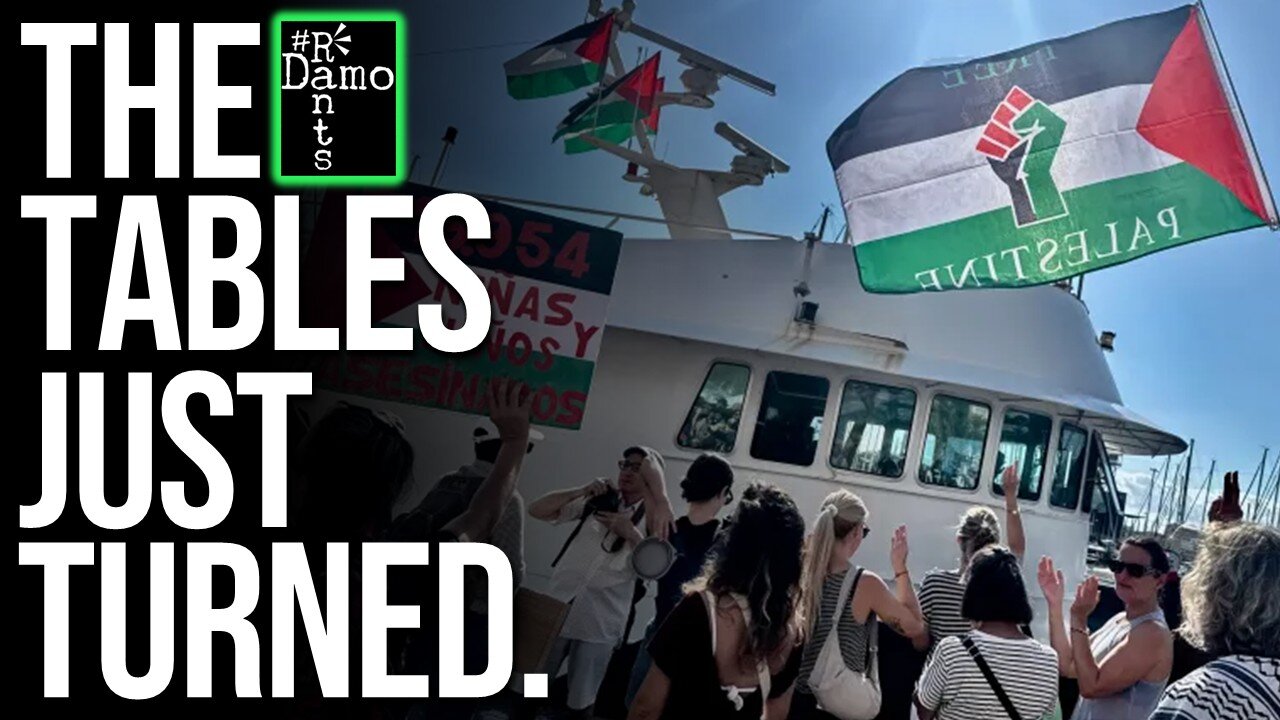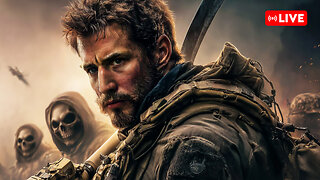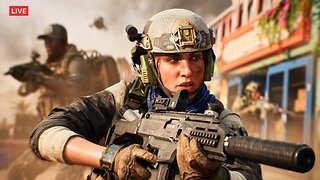Premium Only Content

50 Aid Ships Are Sailing For Gaza – And It’s Left Israel Flailing
Right, so Israel calls it a “security blockade.” Yet somehow the great military power of the Middle East now trembles at the sight of fishing boats carrying powdered milk. From Barcelona, over fifty vessels have set sail under the banner of sumud – steadfastness as that means - carrying activists, parliamentarians, celebrities and clergy. Their crime? Daring to deliver food and medicine to a strip of land where babies waste away, their parents unable to afford the hundred dollars a pack price tag of baby formula in Gaza these days.
Tel Aviv’s ministers are frothing, branding Greta Thunberg, Susan Sarandon, and even Nelson Mandela’s grandson as “terrorists.” You couldn’t write a crueller parody: a nuclear-armed state deploying drones and warships against civilians with cartons of baby milk and other forms of aid, but we know they’ve got form for this by now after the Freedom Flotilla Coalition’s Conscience and the Madleen and the Handala. The Global Samud Flotilla, isn’t just one boat this time but 50, and it sails straight into this absurdity, daring Israel to expose its own siege yet again for what it really is: not defence, but the calculated starvation of a people. A genocide.
Right, so it was about a week ago now that an extraordinary sight unfolded in Barcelona. From the port, dozens of vessels unfurled banners of defiance and solidarity, slipping into the Mediterranean. These ships were not pleasure cruisers or commercial carriers as we know though. They were the Global Samud Flotilla, a coalition of over fifty boats assembled from more than forty countries, carrying thousands of activists, parliamentarians, artists, clergy, doctors and more. They sail with a singular aim: to breach Israel’s maritime blockade of Gaza where one ship was not enough to do so and to deliver essential aid to a population trapped in what the United Nations and humanitarian agencies increasingly describe as a man-made famine.
At the same time as this extraordinary armada was pushing off, another reality was playing out within Gaza itself. In neonatal wards and cramped homes, mothers desperate to feed their babies mixed sugar water or boiled stale bread into mush because infant formula had become both scarce and prohibitively expensive. A single tin of formula, once accessible, now cost over one hundred dollars, enough to feed an infant for only four or five days. Doctors warned that newborns were literally wasting away before their eyes, reduced to “skin and bones.” So herein lies the contrast. On the open sea, an unprecedented show of international solidarity, baby formula very much amongst the aid being taken; on Gaza’s streets, the quiet violence of starvation, designed not by nature but by policy.
The Samud Flotilla is the latest chapter in a sadly long history of civilian-led attempts to break Gaza’s isolation by sea. The most infamous of these was the Mavi Marmara in 2010, when Israeli commandos stormed a Turkish vessel carrying humanitarian aid, killing ten activists in international waters. Survivors reported brutal treatment, including beatings, tasers, and forced deportation papers signed in languages they did not understand. A United Nations inquiry described Israel’s conduct as unlawful and excessive. Amnesty International called for credible investigations, but no meaningful accountability followed.
The Mavi Marmara massacre set the template for how Israel would respond to such challenges: overwhelming force, legal obfuscation, and attempts to delegitimise activists as dangerous radicals rather than humanitarian actors. Yet it also sparked a new wave of solidarity, particularly in Europe and Turkey, where civil society groups concluded that if governments would not confront the blockade, ordinary people must.
Subsequent efforts, such as the vessel Marianne in 2015, and most recently the Conscience, Madleen and Handala this year, were likewise intercepted. Israel seized them, detained their passengers, and deported them either immediately or after a period of detention. These failures, in purely logistical terms, were undeniable. No flotilla had managed to dock in Gaza. But politically and symbolically, they achieved something else. They made visible the blockade that governments and mainstream media often ignored, and they forced the question of legality into public debate.
The Global Samud Flotilla is distinctive because of its scale and composition. With more than fifty vessels, it is the largest civilian maritime convoy in history. Its name, Samud, means steadfastness in Arabic, and the flotilla embodies that spirit. It has brought together diverse movements: the Freedom Flotilla Coalition, the Global Movement to Gaza, the Maghreb Sumud Flotilla, and dozens of solidarity networks from Latin America, Africa, and Europe. Its passengers include celebrities such as Greta Thunberg, Susan Sarandon, Liam Cunningham, and Gustaf Skarsgård, as well as political figures like Ada Colau, former mayor of Barcelona, and Zwelivelile Mandela, grandson of Nelson Mandela. Their presence ensures that this flotilla cannot be dismissed as marginal. It is not only activists and NGOs but also high-profile cultural and political figures who have staked their reputations on confronting the siege.
The symbolism is therefore layered. It is the largest flotilla ever attempted, sailing not from the periphery but from Barcelona, a major European port. It carries not only aid but also the legitimacy of public figures with global recognition. And it sails under a name that signals endurance against oppression, linking Palestinian steadfastness to global struggles for justice.
To understand why this flotilla matters, one must understand the blockade it challenges. Israel’s siege of Gaza is not a new phenomenon. It was imposed in 2007 after Hamas took control of the enclave, but it has been tightened dramatically since October 2023, when the war escalated to unprecedented levels. By 2025, the blockade had produced conditions that humanitarian agencies openly described as famine.
The Integrated Food Security Phase Classification, the body tasked with assessing famine conditions, declared that parts of Gaza had indeed entered famine. UNICEF warned that infants under six months were the most at risk, as they depended on breastfeeding or formula milk, and breastfeeding itself had become impossible for many malnourished mothers. In the first twenty days of August 2025, at least 138 people died of hunger, including twenty-five children. These numbers are staggering in their own right, but they are also indicators of a systemic catastrophe.
The most politically charged shortage has undoubtedly been infant formula. Reports from Reuters described tins selling for one hundred dollars, roughly eighty-five to ninety-five euros, while hospitals cited prices of fifty-eight dollars for smaller cartons. Families unable to afford these exorbitant costs were feeding infants sugar water, date syrup, or ground bread, all of which are nutritionally inadequate and often dangerous. Doctors have described babies reduced to skeletal frames, barely clinging to life.
Sarah Pengelly, a British activist based in the Netherlands, a fellow Cornish person in fact, has launched a fundraiser to provide formula milk for Gaza’s infants addressing the cost of what little is available. Her Steunactie campaign emphasised the harsh reality: one tin at one hundred euros sustains a two-month-old for only four days. Her fundraiser is emblematic of the crisis, demonstrating both the desperation of families and the inadequacy of international responses. In a just world, baby milk would not depend on online fundraisers; it would be delivered freely, as a humanitarian necessity. That it does not arrive, and that civilians must raise funds to buy it at black market prices, speaks volumes about the deliberate cruelty of the blockade. I’ll provide a link to her fundraiser, they are desperate for donations to try and buy up what little milk is still available and ensure it goes where needed.
Formula milk, unlike many other goods, cannot plausibly be described as a security threat. No one can credibly argue that powdered milk poses a danger to Israel. Its obstruction is not an accident or a by-product of war but a deliberate act of collective punishment and warfare by starvation. It surely is evidence of genocidal intent but knowing that doesn’t feed anybody.
It is against this context that the flotilla sails. Its cargo is not just symbolic aid but life-saving supplies. By carrying formula milk, food, and medical equipment, the flotilla exposes the blockade’s cruelty in the starkest possible terms: Israel is not stopping weapons, but milk for babies. And that contradiction is explosive.
Israel faces a dilemma in responding to this much larger Samud Flotilla though. On the one hand, it has consistently enforced its blockade with force, intercepting every flotilla that has approached Gaza. On the other, the presence of globally recognised figures raises the political cost of a violent crackdown.
The precedent of the Mavi Marmara looms large. When Israeli commandos killed those ten activists in 2010, international outrage was swift. Turkey expelled Israel’s ambassador, and a United Nations inquiry condemned the attack. The episode remains a stain on Israel’s reputation. Yet even then, Israel did not lift the blockade. It weathered the storm and carried on.
This time, however, Israel’s rhetoric is harsher. National Security Minister Itamar Ben-Gvir has proposed classifying all flotilla participants as terrorists. He has suggested detaining them in high-security prisons such as Ketziot and Damon, facilities notorious for holding Palestinian prisoners in harsh conditions. He has also floated the idea of seizing the ships and repurposing them for military use.
Such rhetoric signals a willingness to escalate. To harm or imprison high profile figures and this many figures celebs aside would provoke a global outcry far beyond anything we’ve seen so far. Western governments, incessantly and unforgivably reluctant to criticise Israel, would face intense domestic pressure to act and severe backlash if they still insist on not doing so.
Yet Israel has also shown that it calculates carefully which activists to target most harshly. In previous flotillas, lesser-known participants, particularly from the Global South, have reported harsher treatment than Western celebrities or parliamentarians, who were often deported quickly after diplomatic intervention. There is a real risk that this pattern will repeat. Celebrities may be spared the worst, put straight on planes back to the West as was the case with Greta Thunberg previously, while ordinary activists endure abuse. Reports from investigative outlets have already suggested that Israel is preparing harsh detention conditions, including solitary confinement and indefinite holds.
This raises the teaser question that hovers over the voyage: how far will Israel dare to go, with the world watching and high-profile figures on board? If it overplays its hand, it risks detonating not just a confrontation at sea but a legitimacy crisis on a global scale.
Symbolically, the flotilla has already succeeded. The image of fifty boats sailing under the banner of steadfastness has captured global media attention no matter what Israel’s military might do. It has reframed the blockade not as a distant geopolitical issue but as a confrontation between ordinary people and military might. By sailing at all, the flotilla forces the world to look again at Gaza, at famine, at formula milk. Every interception Israel attempts now risks backfiring. Instead of projecting strength, it projects fear of civilians with powdered milk. Instead of demonstrating security, it demonstrates fragility.
Politically, the flotilla has the potential to shatter the blockade’s aura of inevitability. If Israel responds with excessive force, as it has before, it may trigger stronger actions from governments already critical of its conduct. Spain, Belgium, Norway, and South Africa have taken steps toward accountability, from suspending arms sales to calling for sanctions. A bloody interception could accelerate such measures.
Legally, the flotilla may also contribute to cases at the International Criminal Court and International Court of Justice. If Israel intercepts ships in international waters as it has before, it could again be accused of piracy under maritime law, the charge sheet growing each day as it does already. If it detains activists under the pretext of terrorism, it may strengthen charges of apartheid and persecution. Every live-streamed video, every GPS coordinate, every recorded assault will add to the evidentiary record.
Thus, breaking through is not only about reaching Gaza’s shore. It is about tearing through Israel’s narrative of security, ripping open the silence of complicit governments, and detonating legal and political challenges that Israel cannot so easily deflect.
The confrontation at sea is lopsided. Israel deploys missile boats, drones, electronic warfare, and elite commandos. The flotilla sails in fishing trawlers, ferries, and yachts crewed by civilians. But this asymmetry is also the flotilla’s strength. Its vulnerability exposes Israel’s excess.
The flotilla’s true weapons are cameras, livestreams, and the presence of high-profile figures. In 2010, footage of the Mavi Marmara raid shocked the world. In 2025, with ubiquitous smartphones and drones, an interception will be instantly broadcast worldwide. A commando raid against civilians carrying formula milk could become Israel’s next legitimacy crisis, blowing up in its face before a global audience.
The presence of Greta Thunberg, Susan Sarandon, Ada Colau, and Zwelivelile Mandela raises the stakes even higher. If Israeli commandos storm the flotilla, the images will not only show faceless activists but instantly recognisable figures. The world will ask: what kind of state treats such people as terrorists? Israel has no convincing answers for it of that we already know.
Not everyone can board the flotilla. But solidarity does not end at the shoreline. Campaigns such as Sarah Pengelly’s fundraiser provide direct avenues for action. One tin of formula at one hundred euros buys four days of survival for a child. That stark arithmetic crystallises the crisis but also presents each of us with an opportunity to make a difference to a child in Gaza.
The flotilla and such grassroots initiatives are two sides of the same struggle. The flotilla confronts the blockade symbolically and politically; the fundraiser confronts it practically, by getting milk into infants’ mouths despite the siege. Both are acts of resistance against a system designed to starve Gaza into submission.
For readers and viewers following the flotilla, supporting such initiatives offers a way to sail with the flotilla from home in a more meaningful way than just tracking the vessels online ever can. It translates moral outrage into material aid. It ensures that the defiance at sea is matched by action on land, at least for as long as some formula is still present in the Strip.
The Global Samud Flotilla forces the world to confront uncomfortable truths. Israel’s blockade is not about security. It is about domination. The deliberate obstruction of baby milk strips away any pretence. To starve infants is not self-defence; it is the most depraved and sickening cruelty laid bare.
The flotilla’s very name, Samud, reminds us that Palestinians have endured this cruelty for decades with steadfastness. Their endurance is not passive but active, a refusal to disappear despite every effort to erase them. The flotilla links their struggle to global histories of resistance, from anti-apartheid to civil rights, reminding us that international solidarity has always been a weapon against injustice.
The Global Samud Flotilla is not just a convoy of boats. It is a moral test for the world. If Israel stops it, it stops formula milk. If it jails its passengers, it jails activists and even the grandchildren of liberation heroes. If it lets it through, it cracks the aura of its own blockade.
The flotilla’s odds of docking in Gaza are slim. But its chances of docking in the world’s conscience are certain, they’ve already done it. It forces a choice upon all of us: to remain complicit in a blockade that starves babies, or to join in steadfastness, in sumud.
The boats are on the sea. The babies are in the wards, in the tents and among the ruins. The question is not whether Israel will try to stop the flotilla, they will and we know it. The question is how it will try, how much brutality it will dare unleash, and whether we will continue to stop our ears — or finally stop our silence. To support the flotilla, to donate to initiatives like Sarah Pengelly’s, to pressure our governments, is to say: we too sail with Gaza.
Of course expelling and deporting protesters and activists in an aid armada is one thing, expelling the entire population of Gaza is another, but in that regard, Benjamin Netanyahu has suffered something of a major setback. Get all the details of that story in this video recommendation here as your suggested next watch.
Please do also hit like, share and subscribe if you haven’t done so already so as to ensure you don’t miss out on all new daily content as well as spreading the word and helping to support the channel at the same time which is very much appreciated, holding power to account for ordinary working class people and I will hopefully catch you on the next vid. Cheers folks.
-
 LIVE
LIVE
Side Scrollers Podcast
2 days ago🔴SIDE SCROLLERS FUND-A-THON🔴DAY 2🔴100% REVENUE HELPS CHANGE CULTURE!
1,061 watching -
 1:26:56
1:26:56
Glenn Greenwald
4 hours agoTrump's War Against Thomas Massie and Rand Paul; Exposing Corrupt Foreign Influence and DC Rot: With Kenneth P. Vogel | SYSTEM UPDATE #535
68.5K36 -
 LIVE
LIVE
MattMorseTV
5 hours ago $7.26 earned🔴Community Hangout🔴
568 watching -
 LIVE
LIVE
LFA TV
21 hours agoLIVE & BREAKING NEWS! | TUESDAY 10/21/25
600 watching -
 LIVE
LIVE
SpartakusLIVE
2 hours agoHE'S BACK || The #1 KING of Content has ARRIVED
132 watching -
 LIVE
LIVE
SOLTEKGG
24 minutes ago🔴LIVE - BATTLEFIELD 6 BR - Waiting room
35 watching -
 7:55
7:55
Colion Noir
4 hours agoArmed Woman Drags Gunman Out of Store Before Firing Two Shots
21.6K14 -
 LIVE
LIVE
GritsGG
7 hours agoBattlefield 6? Here... We... Go...
40 watching -
 LIVE
LIVE
StevieTLIVE
1 hour agoWarzone Duos w/ Woes
14 watching -
 LIVE
LIVE
Reolock
2 hours agoWoW Classic Hardcore | Ultra Rogue Sneaks onto the Stage!
23 watching